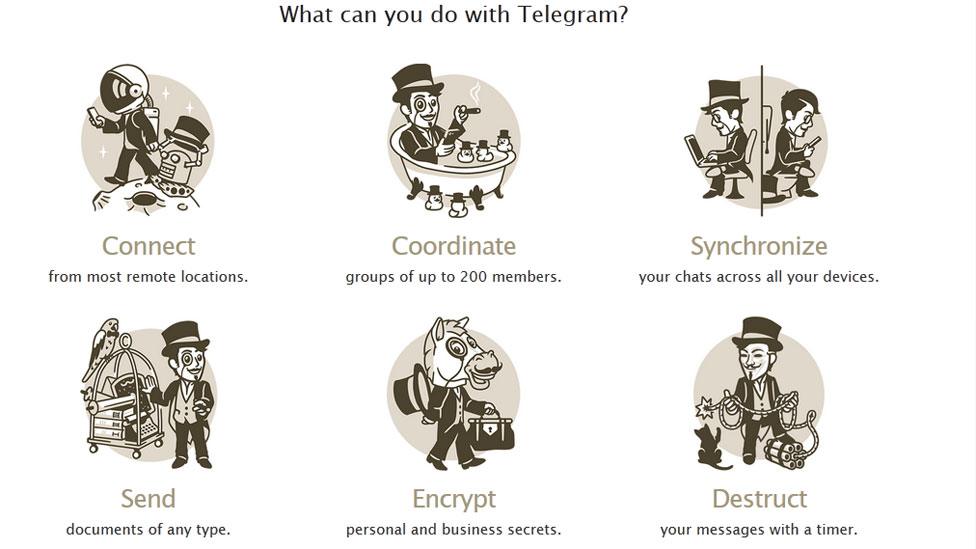Telegram app cracks down on IS propaganda channels
- Published

Telegram says it has blocked 78 accounts being used by IS
The secure mobile messaging app Telegram has started cracking down on propaganda from so-called Islamic State group (IS), nearly eight weeks after the terror group set up its own public broadcast channels there.
IS and other jihadist groups have been exploiting new functionality introduced by the app in late September, which allows users to broadcast their messages to an unlimited number of members via their own Telegram "channel".
In an announcement on Wednesday evening, the Berlin-based Telegram said it had shut down 78 IS channels and promised to make it easier for users to flag "objectionable public content" shared via the app.
"We were disturbed to learn that Telegram's public channels were being used by ISIS [alternative name for IS] to spread their propaganda," said a statement from Telegram, which was set up in 2013 by two Russian brothers, Pavel and Nikolai Durov.
Paris attacks
The action followed claims by IS for the 13 November Paris attacks and the downing of a Russian passenger jet over Egypt's Sinai Peninsula on 31 October.
Shortly before the key IS propaganda channel on Telegram was shut down on 18 November, it had been used to publish IS's English-language magazine Dabiq which hailed the Paris attacks and featured an image of the bomb IS claims to have used to bring down the plane.
IS had shifted its propaganda distribution to Telegram from Twitter on 26 September, just four days after Telegram trumpeted the launch of its new "Channels" tool.
An official IS channel dubbed Nashir, which translates as "Distributor" in English, quickly became the platform where IS propaganda started appearing first, often several minutes before being posted to Twitter - IS's other favoured outlet.

The Anonymous hacking group has tried to shut down pro-IS accounts on Twitter
The channel had amassed over 16,000 subscribers before it was shut down along with a raft of other IS channels used to distribute the group's propaganda in a wide range of languages, including English, French, Russian, Turkish and Urdu.
But many other jihadist Telegram channels continue to be active, including official channels operated by al-Qaeda's branches in Yemen and North Africa and others supportive of IS.
And the clampdown by Telegram has not stopped IS getting its message out, with the group reverting to its network of accounts on Twitter to publish its latest material.
Since July 2014, when IS's last official branded accounts were suspended by Twitter, the group's media operatives have been caught up in a cat-and-mouse game with the site administration, which routinely suspends IS's quasi-official, non-branded accounts.
IS's hopes that Telegram would offer it a more stable and resilient platform for its propaganda appear to have been dashed.
"Secret chat"
But Telegram has indicated that it does not intend to act against terrorists' use of the app's private messaging service, saying it would only move to suppress illegal "publicly available" material.
"All Telegram chats and group chats are private amongst their participants. We do not process any requests related to them," the company says on its website.

Telegram boasts of its many capabilities
Even before IS launched its latest propaganda channel via Telegram, there had been evidence that the group and its members were using the app's private messaging facility.
In September, IS had advertised an Iraqi mobile phone number, which people could use to get in touch with the group via Telegram in order to pay a ransom for two hostages being held by the group.
And jihadists inspired by IS, including a British teenager convicted recently, have used the app's secure encrypted messaging to conduct attack planning.
Jihadists have been drawn by Telegram's boast to provide a "secret chat" facility, which heavily encrypts messages user-to-user with a unique key to avoid interception by hackers or government agencies.
Telegram is so confident of its security that it twice offered a reward of hundreds of thousands of dollars to the first person who could crack its encryption.
BBC Monitoring reports and analyses news from TV, radio, web and print media around the world. You can follow BBC Monitoring on Twitter , externaland Facebook, external.
- Published18 November 2015
- Published18 November 2015

- Published19 November 2015
